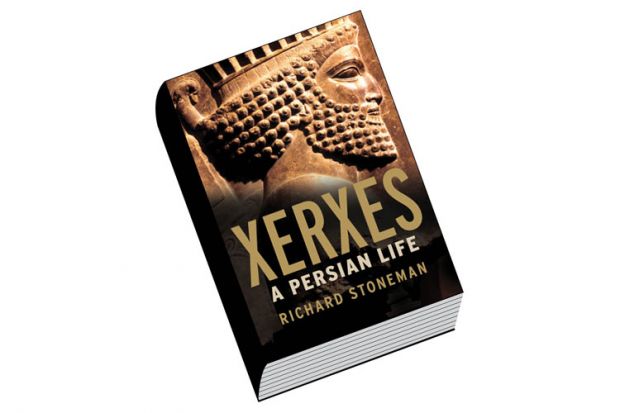Recent scholarly approaches to the lives of ancient Iranian monarchs have opted for the reception studies approach, filtering the rulers through the long lens of ancient and modern historiography. Not so Richard Stoneman. He boldly bucks the trend, and here proves that it is possible to write a very good biography of a long-dead Persian.
He takes a cradle-to-grave (or perhaps we should say harem-to-ossuary) approach in doing so and tackles the complex, conflicting, multi-layered sources with gusto. Xerxes (reigned 486-465BC) is firmly placed in the context of his world and we learn much about the history and culture of the Achaemenid Empire, founded by the military genius of Cyrus the Great and solidified by the brilliant Darius the Great, Xerxes’ indomitable father.
Stoneman’s Xerxes is complex, an individual with grand designs (megalophrosyne, as the Greeks would have it), who enjoyed “conspicuous displays of power and superiority”. Nowhere is this better seen than in his lavish building programme. Even today, if you stand at the foot of the monumental double staircase that leads up to the colossal bull-guarded portal known as the Gate of All Nations at Persepolis in modern-day Iran, you will come face to face with the grandeur of Xerxes’ imperial vision. Stoneman gives an impressively vivid picture of Persepolis and its function, carefully crafting an account of the workings of the Persian court and speaking sense about controversial issues such as the harem, eunuchs and the priestly magi, remarkably – and successfully – fleshing out Xerxes’ world through references to Gore Vidal’s dazzling 1981 novel, Creation, which is set in Xerxes’ empire. The Greek wars are handled with flair, but (rightly) they are not allowed to dominate the work. Xerxes’ complex religious policy is especially well handled.
Stoneman justly reinforces the notion that for the Greeks the Persians were a puzzlement. Take the story that Herodotus tells of Xerxes’ infatuation with a plane tree (and set it, if you wish, to strains of Handel’s Largo); Stoneman regards this as being “consistent with a love of gardens that has always characterised Persian culture” and a reflection of the monarch’s mastery of the environment. He stresses that for the Greeks, Persian gardens were a symbol of Oriental decadence: “a garden for a Greek is a place where you grow onions”.
Yet this volume is more than a “life”. Stoneman is a great Persophile (it takes one to know one) and he dazzles the reader with his familiarity with Iran’s culture, and its poetry in particular. He argues that echoes of Xerxes are traceable in the Shahnameh (the Book of Kings, c.AD1010), especially in the character of Esfandiyār, a ruler renowned for his cunning, bravery and brilliance. His claim is utterly convincing.
Xerxes has had bad press. The louche tyrant of the Greek sources and a dupe and comic stooge in the Hebrew Book of Esther would become, in the preposterous Hollywood movie 300: Rise of an Empire, a satanic entity, a proto-Islamic State fanatic. Even in Iran his reputation is, at best, ambiguous. I have met many young Iranians whose names, Kourosh and Dariush, are proudly sported in emulation of the ancient greats, Cyrus and Darius. But I know only one Khashayar, Xerxes. He runs a bookshop in Isfahan. Next time I’m there, I’ll give him a copy of Stoneman’s rewarding life (and afterlife) of Xerxes. I want Khashayar to be proud of his namesake.
Lloyd Llewellyn-Jones is professor of ancient Greek and Iranian studies, University of Edinburgh. He is author of King and Court in Ancient Persia 559 to 331 BCE (2013) and editor of Edinburgh University Press’ series Edinburgh Studies in Ancient Persia.
Xerxes: A Persian Life
By Richard Stoneman
Yale University Press, 288pp, £25.00
ISBN 9780300180077
Published 13 August 2015
Register to continue
Why register?
- Registration is free and only takes a moment
- Once registered, you can read 3 articles a month
- Sign up for our newsletter
Subscribe
Or subscribe for unlimited access to:
- Unlimited access to news, views, insights & reviews
- Digital editions
- Digital access to THE’s university and college rankings analysis
Already registered or a current subscriber? Login




